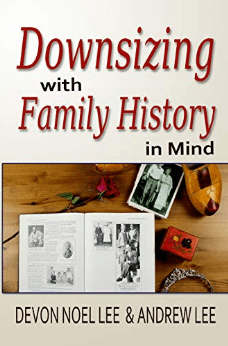Fire, Flood or Earthquake? 5 Tips for Researching Disasters in Your Family History
We have five strategies for researching disasters for family history. They come in response to a listener email about her own “disaster-prone family.” Use these tips to learn about natural or man-made disasters, epidemics, travel accidents, and more that affected your ancestors, and very possibly more about your ancestors role in these events.
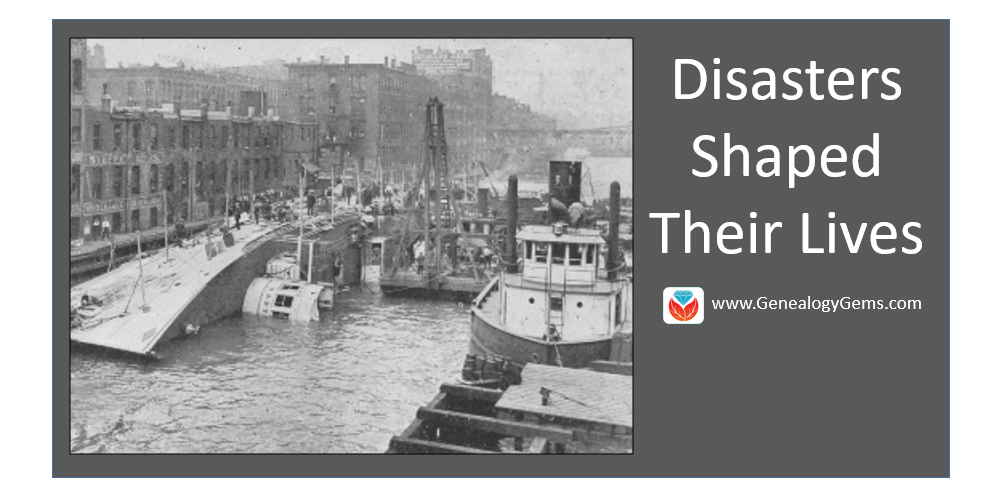
View of Eastland taken from Fire Tug in river, showing the hull resting on it’s side on the river bottom. Wikimedia Commons image; click to view with full citation.
It might seem a little sad to search out disasters, epidemics, and accidents in the lives of your ancestors, but it certainly helps us see things in a different light. Genealogy Gems Editor Sunny Morton has shared recently how enthralling it has been for her to dig deeper into her ancestor’s experience of living through the Johnstown Flood. She used many of the tools I write about extensively in my book The Genealogist’s Google Toolbox (Google Books, Google Earth Pro, and even YouTube) to add an amazing amount of meat to the bones of the story.
I also recently received an inspiring letter from Natalie, a Genealogy Gems Premium Member about how researching disasters in her family history turned her into a passionate genealogist. Here’s what she said:
“Dear Lisa and Company,
I just subscribed to your Premium podcast and must say that listening to Premium Podcast episode 143 affirmed that I made an excellent decision!
I also had family members who were in the Johnstown Flood, since that’s where my family initially immigrated. My parents and I were born there and [I] have heard of stories of the Great Flood of 1889 since I can remember. There was a long-standing family story about my 2nd great-aunt, Julia Pfeiffer Rohr, being pulled out of the floodwaters by her hair.
Ironically or not, my ancestors relocated to Chicago a few years after the Johnstown Flood, only to have my maternal grandmother’s sister (who was a few months away from her 19th birthday) killed while aboard the Eastland [steamship in 1915]. Not sure why some families are ‘disaster prone’ through the generations, but ours seems to be one of those.
I learned about the Eastland Disaster as an adult when my mother’s half-sister in Chicago wrote and shared a family history with me. As a Twin Cities journalist, I published an article (click here and go to page 5) in one of the community newspapers about the disaster.
Still, at the time, I found next to nothing on the Eastland, which was both frustrating and puzzling. [Since then,] I’ve done a ton of research on the event and have written larger pieces, including a to-be published book. I didn’t intend to become an expert on a shipping disaster, but that’s what happened. Also, this marked my entrance into the amazing world of family history.”
5 Tips for Researching Disasters in Family History
Learn more about the disasters your own family experienced with these 5 tips that I shared with Natalie in the Genealogy Gems Premium Podcast episode 145. Although these tips are for researching the Eastland disaster specifically, you can absolutely put them to work for you!
1. Start with Google. The world’s leading search engine, Google.com can lead to rich resources you may never find in a local library or archive. In the case of the Eastland disaster, a Google search immediately brought up a website dedicated to the event. The casualty list had everyone’s name, age, gender, marital status, ethnicity, and the cemetery in which they were buried.
2. Next, we go to Google Books, where Google takes you deeper and more specifically into historical books. Using the Eastland disaster as our criteria, the first result was a published final report by the American Red Cross’ disaster relief committee on what happened, and how the affected families were helped. Several published histories of the disaster were also listed there. These can be purchased, or you can find copies of them through inter-library loan at your local library. If you just want to see which books in the search results can be read for free, click the Tools button under the search box, and a new menu bar will pop up. Click Any books, then choose Free Google eBooks, like so:
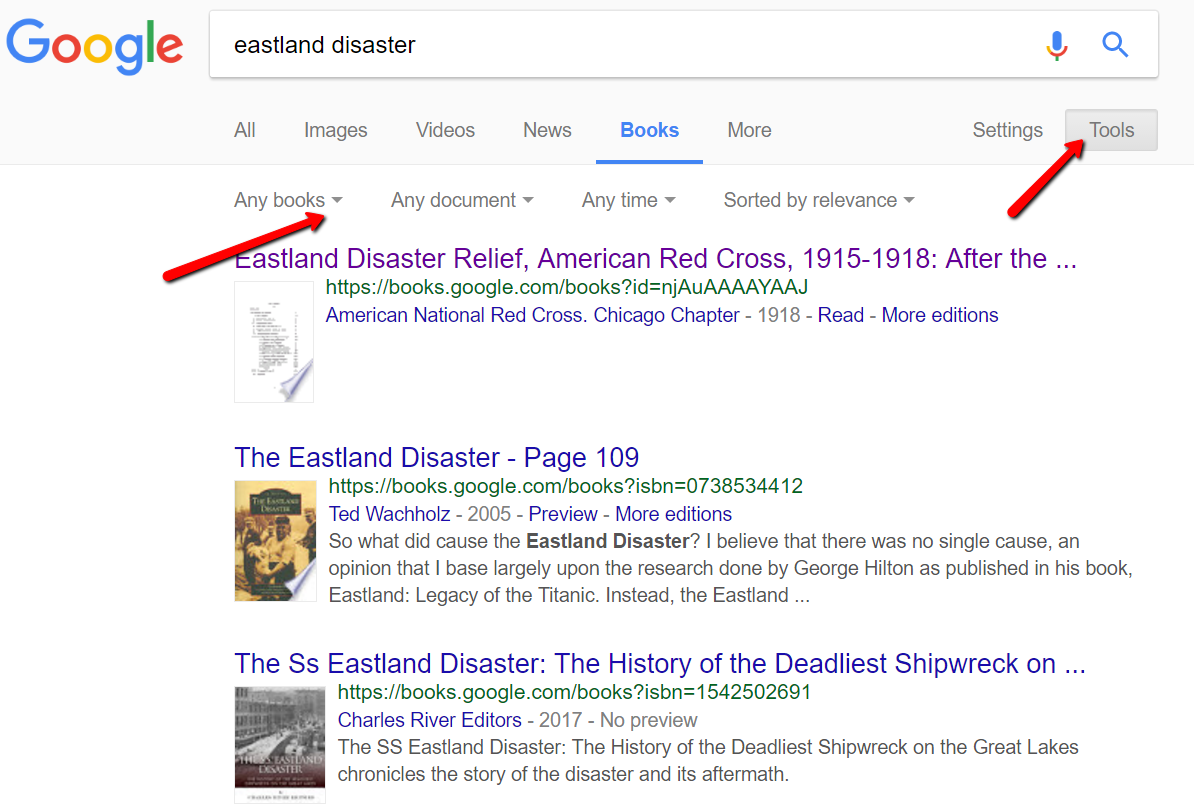
Watch my free video tutorial on finding free e-books on Google. This video is one in a series of tech tip videos available for free at my YouTube channel. Click the Subscribe button while you’re there and you will be notified each time a new genealogy video is published.
3. Keep checking back! New things come online every moment of every day. In 2015, historical video footage about the Eastland disaster was discovered and identified in an online archive (see my blog post about that). But of course it’s impossible to rerun the same searches every day looking for new and updated material. The answer: set up a Google Alert for your search query. That way Google will do the searching for you, and you will receive an email only when Google finds new and updated items that match your search terms. Read my article on How to Set-up Google Alerts for step by step instructions on how to set up your own Google Alerts. Then read How to get the Most out of your Google Alerts for Genealogy.
4. Search YouTube separately. YouTube has several video clips of the Eastland disaster. The Chicago Tribune has wrapped that historical video clip into a short video documentary that includes additional photos their researchers discovered. You’ll also find an animation from the Eastland Disaster Historical Society that recreates what happened and how. Read chapter 14 in my book The Genealogist’s Google Toolbox, Second Edition which is devoted to using YouTube for your genealogy research.
5. Explore Gendisasters.com. This site compiles information on all kinds of tragedies from the past: tornadoes, fires, floods, and buggy-related disasters are just a small sampling of what they cover. You can search by type of disaster, but if you’re not quite sure how it might be filed (like was it a drowning or a ship disaster?), then search by year or place. I looked for Eastland disaster first under ship disasters, and I saw that events are listed alphabetically by place, specifically by city in most cases. There isn’t a way to jump easily to “Chicago,” so I had to scroll through several pages, but I did find it under Chicago, IL Steamer Eastland Disaster, July 1915. Since I already knew the city and date, I could have gotten to it faster by searching under those tabs, but I sure saw just how many events are cataloged at Gendisasters.com. It’s amazing!
Avoid Disaster with the Right Tools
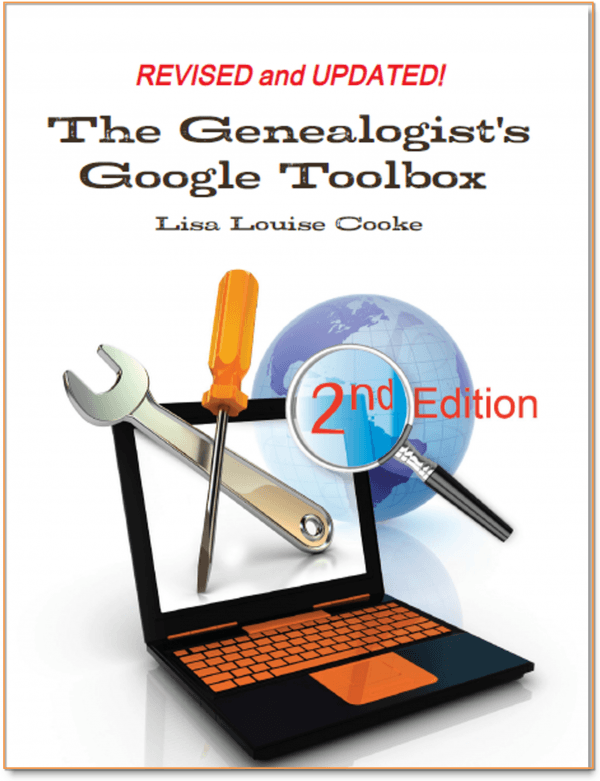 Lastly, some of the disasters you are researching may have a website dedicated to it. The Eastland disaster webpage has several interesting pictures of the ship and the disaster itself. There’s a nice long narrative about the tragedy and some transcribed newspaper articles, as well.
Lastly, some of the disasters you are researching may have a website dedicated to it. The Eastland disaster webpage has several interesting pictures of the ship and the disaster itself. There’s a nice long narrative about the tragedy and some transcribed newspaper articles, as well.
Researching disasters for family history can be exciting and enjoyable. The world wide web is truly like a time machine. See what other ways you can use Google for genealogy in my book, The Genealogist’s Google Toolbox. Effective Google searches, Google Earth, Google Alerts, and Google Translate are just the tip of the iceberg! You will become a Google guru in no time.
Free Genealogy Records from Around the World: Newly Online!
Free genealogy records, newly available online, may be able to take you around your ancestor’s world! This week’s record destinations include Australia, Belgium, Brazil, Bolivia, Canada, Chile, Dominican Republic, France, Italy, Netherlands, Nicaragua, Russia, and South Africa.

Civil registration records–key genealogical resources–from several countries are among the free new family history records online in recent days and weeks. But you’ll also find probate records, church records, military personnel records, and even a digital archive meant to preserve ancient aboriginal languages. Which might mention your ancestors?
Argentina
Over 100,000 indexed names have been added to FamilySearch’s free collection, Argentina, Entre Ríos, Catholic Church Records, 1764-1983. According to a collection description, it includes “baptisms, confirmations, marriages and burials for cities in the province of Entre Ríos.”
Australia
An exciting new Australian website houses a digital archive of Aboriginal and Torres Strait Islander language materials. It includes texts, audio, video, and ebooks about Australia’s First Nations languages. The hope of the site is to be a digital repository for gathering, preserving, and sharing materials that in effect preserve these languages and revitalize their use. The site managers will continue to work with partners to bring more content to the site. Click here to read more about the site’s launch, and click here to access it directly.
Belgium
Two free Belgian civil registration collections at FamilySearch.org have been updated:
Both of these collections are comprised of civil registration of births, marriages, and deaths from the Belgium National Archives, as well as marriage proclamations, marriage supplements, and some original indexes. Additional images will be added as they become available.
Brazil
Several free Brazilian genealogy records collections have been updated at FamilySearch.org. Among them are the following:
- Pernambuco, Civil Registration, 1804-2014 (more than 300,000 newly indexed records)
- Piauí, Civil Registration, 1875-2013 (nearly 150,000 newly indexed records)
- Brazil, São Paulo, Immigration Cards, 1902-1980 (over 20,000 newly indexed records)
Bolivia
Over 300,000 indexed names have been added to FamilySearch.org’s enormous free collection of Bolivia Catholic Church Records, 1566-1996. The collection hosts over 1.5 million digitized images of Catholic Church records created by parishes in Bolivia. “These records include: baptisms, confirmations, marriages, pre-marriage investigations, deaths, indexes and other records. Some of these records have been indexed and are searchable as part of this collection. Additional indexed records will be published as they become available.”
Canada
Library and Archives Canada continues to update its free Personnel Records of the First World War database. So far, the database includes “digitized files for many individuals of the Canadian Expeditionary Force and the Royal Newfoundland Regiment and Newfoundland Forestry Corps (courtesy of the Rooms Provincial Archives).”
Newly digitized CEF files are added to the references every two weeks, states the collection’s landing page. To date, over 461,000 of an expected 640,000 files have been added. “Library and Archives Canada is digitizing the service files systematically, from box 1 to box 10686, which roughly corresponds to alphabetical order,” explains a blog post. “Please note that over the years, the content of some boxes has had to be moved and, you might find that the file you want, with a surname that is supposed to have been digitized, is now located in another box that has not yet been digitized.”
Chile
FamilySearch.org has updated its free collection, Chile Civil Registration, 1885-1903. These include “births, marriages, and deaths for various localities in Chile from 1885 to 1903. For a complete list of all the provincias and comunas included in this collection, see the Provinces of Chile – Civil Registration coverage table. Only records from a few localities have been indexed. More records and images will be added as they become available.” Need help reading these? FamilySearch suggests using this Spanish Genealogical Word List, which also links to other translation tools.
Dominican Republic
Over 175,00 indexed names have been added to FamilySearch’s free collection, Dominican Republic Civil Registration, 1801-2010. Spanning over 200 years, the collection includes images of births, marriages, and deaths as well as some divorces and indexes. “Some of these records have been indexed and are searchable as part of this collection,” states the collection description. “Additional images and indexed records will be published as they become available. These records were obtained from public access sources in the Dominican Republic.”
France
FamilySearch has updated its collection of indexed Catholic parish record images for Coutances et d’Avranche Diocese, 1533-1894. Baptisms, marriages, and burials are all included. “Parishes within this diocese are within the boundaries of the department of Manche,” states a collection description. “French commission for Informatics and Liberties (CNIL) does not allow publication of sensitive data below 150 years.”
Italy
FamilySearch continues to publish more Italian civil registration records! These are some of the latest:
- Asti, 1803-1814, 1911-1935. Over 50,000 indexed records have been added to this existing collection.
- Bergamo, 1866-1901. Over 25,000 indexed names have been added to this database.
- Chieti, 1866-1930. Over a half million browsable images comprise this new collection.
- Macerata, 1808-1814. Over 90,000 browsable images are in this new collection.
Netherlands
Just shy of a million records have been added recently to FamilySearch’s free collection, Netherlands, Archival Indexes, Miscellaneous Records. “Archives around the Netherlands have contributed indexes which cover many record sources, such as civil registration, church records, emigration lists, military registers, and land and tax records,” says the collection description. “These records cover events like birth, marriage, death, burial, emigration and immigration, military enrollment and more. These indexes were originally collected, combined and published by OpenArchives.”
Nicaragua
There are now over two century’s worth of records in the free FamilySearch collection, Nicaragua Civil Registration, 1809-2013. It includes “births, marriages, deaths, and other records created by civil registration offices in various departments of Nicaragua.” Civil registration in Nicaragua didn’t begin until 1879, and it appears that most records in this collection date from that year or later.
Paraguay
Nearly 125,000 browse-only images have been added to FamilySearch.org’s free collection, Paraguay Miscellaneous Records, 1509-1977. According to the site, “These records include two complete collections: Sección Nueva Encuadernación (Rebinding Section) and Sección Propiedades y Testamentos (Properties and Wills Section). Copies of the original records are housed at the Archivo Nacional in Asunción, Paraguay. The “Propiedades y Testamentos” section can give a brief look at the personal wealth of clerics, economic bases of resident foreigners in Paraguay, or the fortunes of a given family over a period of time.”
Russia
FamilySearch.org has updated its free collection, Russia, Samara Church Books, 1779-1923. It includes “images and partial index to records of births and baptisms, marriages, deaths and burials performed by priests of the Russian Orthodox Church in the province of Samara. These records were acquired from the state archive in that province.” Another brief statement in the collection description illustrates the incremental and ongoing nature of record additions to FamilySearch: “Currently this collection is 4% complete. Additional records will be added as they are completed.”
South Africa
Over 40,000 indexed records have been added to the free FamilySearch.org collection, South Africa, Transvaal, Probate Records from the Master of the Supreme Court, 1869-1958. The records are described simply as “probate records from the Master of the Supreme Court, Transvaal, South Africa. Original records are located in the Transvaal Archives Depot, Pretoria, Republic of South Africa.
Spotlight on probate records
 Probate records detailed the final settling of our ancestors’ financial assets. They often contain rich genealogical information and interesting insights into a person’s life. They are among the many records you might find at courthouses and government archives. More U.S. probate records are coming online (click here to learn more), but even if you have to visit a courthouse yourself or hire someone to do it for you, it’s often worth it. Click here to read why.
Probate records detailed the final settling of our ancestors’ financial assets. They often contain rich genealogical information and interesting insights into a person’s life. They are among the many records you might find at courthouses and government archives. More U.S. probate records are coming online (click here to learn more), but even if you have to visit a courthouse yourself or hire someone to do it for you, it’s often worth it. Click here to read why.
Thanks for sharing this post with those who will want to know about these free genealogy records online!

Episode 228: The Free Genealogy Gems Podcast
Genealogy Gems Episode 228 In this episode: More new feature enhancements announced by Ancestry.com Listeners Trisha and Betty share their stories with Lisa in person Lisa’s interview with Crista Cowan, The Barefoot Genealogist at Ancestry.com The Tombstone Tourist,...Genealogy Gems Podcast Episode 234
In this episode we take a look at a subject that is difficult, and yet ultimately faced by all genealogists: Downsizing. Whether you need to help a relative downsize, or it’s time for you to move into a smaller place or just carve out more room in your existing home, this episode is for you. You’ll hear specific action steps that you can follow to the make the job of downsizing easier and more productive.
Also in this episode we’ll cover the latest genealogy news, and take a quick look at the 1830 census.
Listen now, click player below:
Episode #234 with Lisa Louise Cooke
October 2019
Please take our quick podcast survey which will take less than 1 minute. Thank you!
Genealogy News
New and Returning genealogy-themed television Shows:
A New Leaf on NBC
A New Leaf will be included in the Saturday NBC morning programming block called The More You Know beginning October 5, 2019.
From the Ancestry Blog:
“Each week ‘A New Leaf’ will follow people on the cusp of key life inflection points, who using family history, genealogy, and sometimes AncestryDNA® analysis will go on a journey of self-discovery and learn from the past while looking to the future. In partnership with Ancestry, Fuentes will join families as they learn the importance of appreciating and understanding their family history and ancestors in order to make important life decisions. ”
Website: https://www.nbc.com/a-new-leaf
Finding Your Roots on PBS
Henry Louis Gates Jr.’s sixth season of Finding Your Roots on PBS will have two new episodes this fall and eight more in January 2020.
The new people featured include Melissa McCarthy, Jordan Peele, Isabella Rossellini, Gayle King, Terry Gross, Queen Latifah and many more.
Check your television schedule and cable provider.
Website: http://www.pbs.org/weta/finding-your-roots/home/
The DNA of Murder with Paul Holes on Oxygen
Another new show that taps into genetic genealogy is The DNA of Murder with Paul Holes.
It premieres October 12 at 8 p.m. on the Oxygen channel.
Website: https://www.oxygen.com/dna-of-murder
New Services for Genealogists:
Legacy Tree Genealogists Offers a New Consulting Service
Visit: https://legacytree.com/genealogygems
From the press release:
“Genealogist-on-Demand: Legacy Tree Genealogists Launches Virtual Consultation Service Offering Access to Family History Experts, Any Time, Any Where.
Legacy Tree Genealogists announced today the launch of a new service—45-minute, virtual one-on-one consultations with a professional genealogist. At only 100 USD, these consultations provide users with a cost-effective resource to have their research questions answered in real-time by a professional genealogist, from the comfort of their own home.
Users have the option to schedule either a DNA Consultation with a genetic genealogist who can explain their DNA test results, or a Genealogy Consultation with access to one of their worldwide researchers with expertise in regions around the globe, including England, Ireland, Scotland, and Australia.
Tailored to your specific research questions, the one-on-one consultations are conducted utilizing screen sharing technology that allows the user to share documents, records, or DNA results with the genealogist in a secure, virtual environment.
Legacy Tree will continue to expand its consultation offerings to include additional regions in the near future in order to continue to serve the global genealogy community.”
Larsen Digital Now Digitizes Your Old Negatives
Visit the Genealogy Gems page at Larsen Digital here and use the coupon code GENGEM.
In the past I’ve told you about the incredible work that Larsen Digital did for me getting some of my old home movies digitized. Well, they’ve just launched a new service where you can send them your old negatives and they will convert them into beautiful high-resolution digital images that you can use. We’re talking 4000 dpi images!
I’ve had boxes of negatives in my closet that I inherited from my paternal grandmother. She had negatives for all sorts of pictures that are either long since lost or the photo album went to someone else in the family.
I really had no idea what these old photos would turn out to be, but I ended up with wonderful images of my great grandmother, my grandparents, my Dad when he was a kid, and countless relatives.
The service is called Value because it’s less expensive than the Pro which includes restoration. It’s a great way to get all your old negatives digitized. Then you can decide if there’s further restoration you want done on select images.
DIY: You can do color correction and repairs yourself with a simple free app like Adobe Fix. See my book Mobile Genealogy for much more on using this and other apps for genealogy.
Negatives can deteriorate over time just like photos. The sooner you get them digitized the better condition images you will have.Larsen Digital is offering Genealogy Gems listeners a great discount on both the new value service and the Pro negative digitization service, as well as 35mm negatives & 35mm Slides. Visit the Genealogy Gems page at Larsen Digital here and use the coupon code GENGEM.
Here are a few examples of old negatives that I had digitized by Larsen Digital.
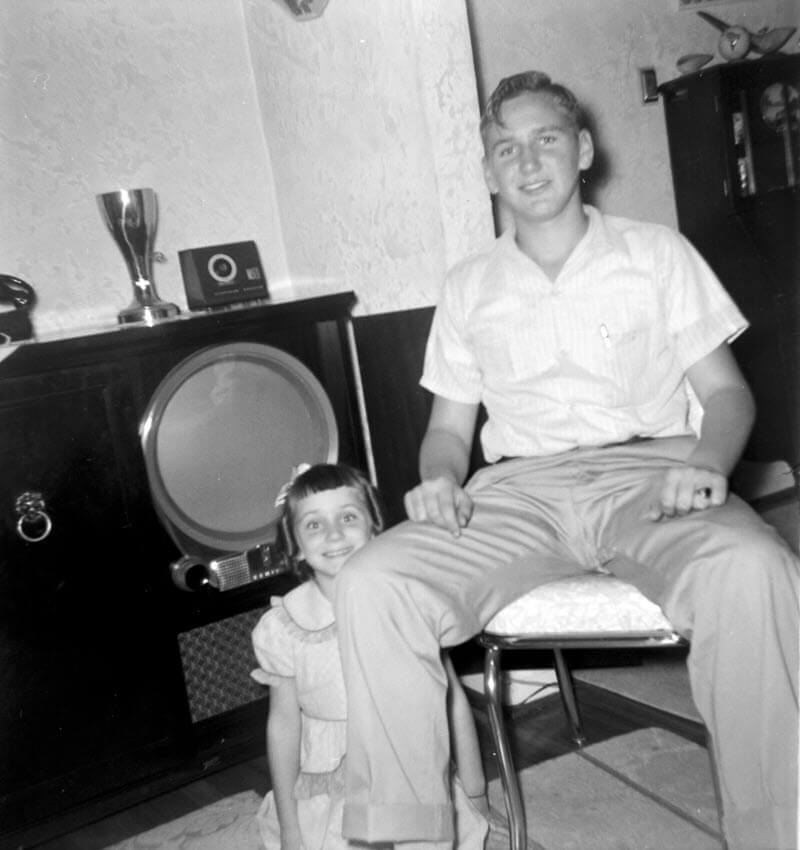
My Dad with this family’s first TV set!
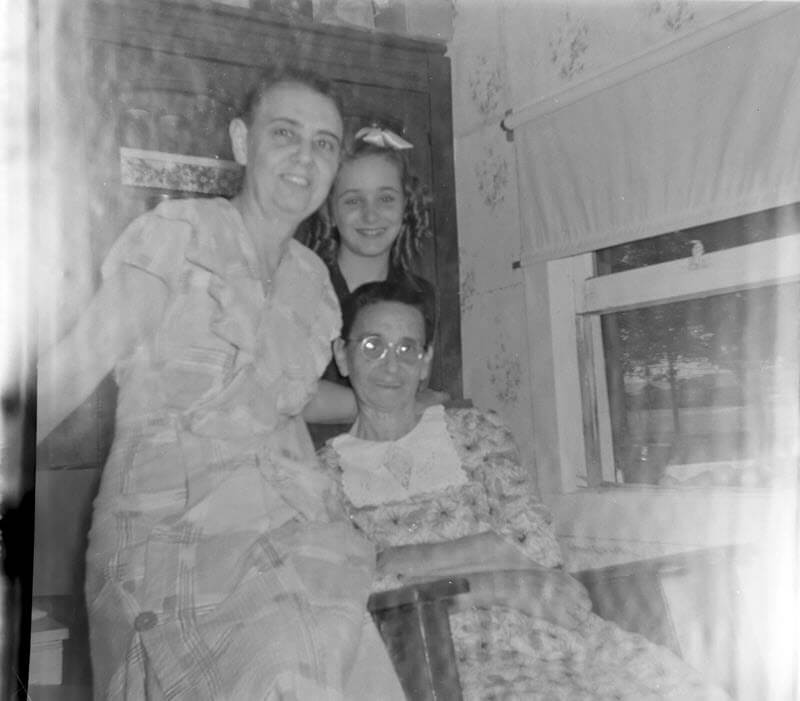
Never before seen image of my great grandmother (seated), her daughter and grand daughter. Watch the video that autoplays on this page to see how I restored this photo after receiving the digitized image.
It’s really kind of amazing to think I’ve sat on these negatives for so long. I’ve been sending the pictures to my Dad and he’s been emailing me back not just the names and dates, but the stories behind many of these photos.
Findmypast Now Supports Tree to Tree Hints
Long gone are the days of having to search for genealogical records all alone. When you have any part of your family tree online on any of the “Genealogy Giants” websites (Ancestry, MyHeritage, Findmypast and FamilySearch) they do a lot of the hunting for you. They deliver hints that have a good chance of matching up with your ancestors. Your job is to carefully review them and determine if they are your ancestor’s records.
(Genealogy Gems Premium Members: Listen to Premium Podcast Episode #175 devoted to hints at Ancestry that includes a bonus download guide on Genealogy Hints at a Glance.)
Up until now, Findmypast offered hints on birth, marriage and death records. Now they are joining the other Genealogy Giants in offering hints based on other user’s family tree on their website.
Read the rest of my article here.
The free podcast is sponsored by:
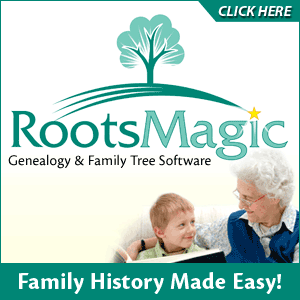
Lisa Louise Cooke uses and recommends RootsMagic family history software for her master family tree. Visit www.RootsMagic.com
GEM: Downsizing with Family History in Mind with Devon Noel Lee
Get your copy of Downsizing with Family History in Mind here.
(We hope you enjoyed the interview. Disclosure: Genealogy Gems is a participant in the Amazon Services LLC Associates Program, an affiliate advertising program designed to provide a means for sites to earn advertising fees by advertising and linking to Amazon.com. Thank you for supporting our free podcast by using our link.)
At some point we all face downsizing. Whether we are helping our parents downsize to a smaller house, or we need to downsize our own belongings to carve out a spare bedroom or just make room in a closet. it’s never really an easy task. And I think it’s safe to say it’s even more difficult for the family historian, because we collect a lot of paper, photos and other things that are often near and dear to our hearts.
Devon Noel Lee and her husband Andrew Lee of the Family History Fanatics YouTube channel have taken on this challenge themselves and they’ve written a new book called Downsizing with Family History in Mind. Here to help you make the tough choices and clear the clutter is Devon Noel Lee.
There are many reasons for downsizing:
- To move to a smaller place
- Absorbing inherited genealogy
- Divorce
- To free up space in your own home
Downsizing the sentimental items is the hardest part of downsizing.
Question: A lot of us just think, well it’s a Saturday morning, I think I’ll just do some decluttering. But you say in the book that decluttering doesn’t work. Why is that?
Devon’s Answer:
“There are three things that experts teach us that are absolutely wrong:”
- We don’t give ourselves enough time for nostalgia.
- We’re really bad at evaluating what’s going to last for the long term
- We use the wrong boxes when decluttering – all the experts say to use Keep, Sell and Donate.
Devon recommends the following boxes:
- Keep
- Giveaway (combining sell and donate) – to family, societies, archive, university special collections, libraries, etc.
- Trash (or recycle)
- Process
How to “process”:
- Digitize
- Process the information in your binders and get rid of the binders if no one wants them.
Use it:
- Sad to say, most people don’t want your family china. Give yourself permission to use it and enjoy it now. Make memories with it!
- Let your children play with things.
Four Basic Downsizing Principles in the book:
Reduce: Divide things into the boxes.
Preserve: This is when you’re going to digitize the things in your process box. Photograph objects. Transfer your genealogy into software and online trees.
Reclaim: Take everything out of the process box after processing, and divide into Giveaway, Trash and Keep. Don’t put things into storage!
Showcase: Put on display what you found worth keeping so it can be enjoyed. Transform what you have into something that is easier to pass on like videos, podcasts, scrapbooks. Focus on story-based items.
From Lisa: It puts us back in control as to what happens to it. Making sure the right people get it.
I’m a big fan of displays. If we haven’t taken a moment to get something on the wall – to put a display together – how can we expect our family to appreciate it and embrace our family history values?
Question: Many downsizing projects are much more than a single day. When you’re faced with a really big job, where do you recommend that people start, and where should they put their primary focus?
The book includes action plans for folks who have:
- just an hour
- Weekend
- 3-6 months
- 6-12 months
Capture what is right now:
- Photograph the outside of the home.
- Photograph what’s inside.
- Then focus on photographing the collections in their context.
Mentioned by Lisa:
Genealogy Gems Podcast episode #21 includes a Gem called Thanks for the Memories. In it, I share an example of mentally walking through my Grandma’s house and capturing all of my memories on paper.
Get a piece of paper or pull up a word document. Close your eyes for a moment and visualize a favorite memory from your childhood.
In my case I started with a favorite place, my maternal grandma’s house. But perhaps yours is the back alley where you and your friends played baseball, or your great uncle’s garage where he showed you how to work on cars. Whatever is meaningful to you.
Now, open your eyes, and write your thoughts one at a time. Just free flow it. They don’t have to be complete sentences.
Later you can try your hand at writing more of your actual experiences or memories of a person. Again, it doesn’t have to be a novel or sound really professional. It’s just the memories from you heart.
Family Photos:
Question: If we have piles and piles of family photos, particularly ones we’ve inherited, how to do we decide which to keep and which to toss? Or do you ever toss?
Devon’s answer:
Get rid of the duplicates!
Keep 1 of the biggest and best and throw the rest away. Don’t bog yourself down with hours spent trying to track down someone else to give them to.
Get rid of blurry, overexposed, underexposed, and meaningless photos.
Unlabeled photos:
There will be some circumstances where you will not be able to keep them. You can’t go into debt for unlabeled photos. You want to separate them from the labeled so that other family members don’t throw them all out together.
If you have time, try to identify them by asking relatives, and posting them to DeadFred.com.
If you can, donate the remaining unlabeled photos to orphaned photo collectors, or toss.
You did the best you can. Don’t feel guilty because your ancestors didn’t label their photos.
Question: What advice do you give your readers who are faced with what to do with their genealogy when they don’t have descendants or when no one in the family wants it? What encouragement can you offer when there is no one who descends from you, or there is no one who wants them.
Devon’s answer:
If you think you don’t have anyone in your family who is interested, you’re wrong.
Downsizing and organizing will increase the chances of someone willing to take it later.
If you don’t have anyone in your immediate family who wants your stuff, start looking for distant cousins actively working on a surname. They won’t want everything. You will have to divide the material. They want it organized.
Do it while you’re living – don’t leave it to someone else.
Digitize it and get it online where it can be shared.
From Lisa:
Getting your stuff in good condition makes it more desirable.
Our collection, broken up, may have much more value to other people.
Get your copy of Downsizing with Family History in Mind here.
(We hope you enjoyed the interview, and thank you for using our link.)
The free podcast is sponsored by:

MyHeritage.com is the place to make connections with relatives overseas, particularly with those who may still live in your ancestral homeland. Click the logo to learn more.
GEM: Profile America – The 1830 U.S. Federal Census
Saturday, October 5th.
The national census to be taken April 1 next year will be the 24th time this once-a-decade count has been conducted since 1790. The fifth census in 1830 profiled a quickly expanding nation, counting nearly 13 million residents — an increase of more than one-third in just 10 years.
New York remained the largest city, while second and third places were a near tie between Baltimore and Philadelphia. Also, among the 10 biggest cities were Charleston, South Carolina, and Albany, New York.
In the decade to follow, Cyrus McCormick invented the grain reaper, opening huge sections of the Great Plains to agriculture, and Texas declared its independence from Mexico.
Sources:
POP Culture: 1830
Read our latest articles at Genealogy Gems:
Become a Genealogy Gems Premium eLearning Member
Gain access to the complete Premium podcast archive of over 150 episodes and more than 50 video webinars, including Lisa Louise Cooke’s newest video The Big Picture in Little Details.
Become a member here.
Please Help Us by Taking the 1 Minute Genealogy Gems Survey
Please help us create the best podcast for you by taking this very short survey.
Get the Genealogy Gems Podcast App
Get the right app for your phone or tablet here.
Follow Lisa and Genealogy Gems on Social Media:
- Instagram.com/genealogygemspodcast
- Facebook.com/genealogygems
- Pinterest.com/lisalouisecooke
- YouTube.com/GenealogyGems
Stay Up to Date with the Genealogy Gems Newsletter
The Genealogy Gems email newsletter is the best way to stay informed about what’s available with your Premium eLearning Membership. Click below to sign up today.
Learn more about Backblaze computer cloud backup and get your computer backed up today at www.backblaze.com/Lisa
Download the Show Notes PDF in the Genealogy Gems Podcast app.

